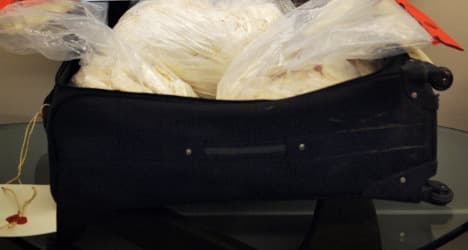'Air Cocaine' affair: Pilot unions urge boycott

French pilots have been urged to refuse to fly to the Dominican Republic in protest over the arrest and detention of two colleagues, who have been accused of smuggling drugs in what has been dubbed the "Air Cocaine" affair in France.
France's main pilots' union on Tuesday called for French commercial airline pilots to boycott the Dominican Republic to protest the 11-month detention of two colleagues there on drug smuggling charges.
The SNPL France Alpa union in a statement appealed to pilots with French contracts "to refuse to carry out flights to the Dominican Republic".
The union's president, Yves Deshayes, said two Air France pilots on Tuesday had said they would not fly to Santo Domingo, but they were replaced by others who did.
The union launched the action in support of two pilots, Pascal Fauret and Bruno Odos, who were arrested on March 20, 2013 when Dominican Republic anti-narcotics officials discovered 700 kilos of cocaine in their plane.

The aircraft, a Falcon 50 private jet owned by a French millionaire owner of a chain of eyeglass stores, Alain Afflelou.
The famed owner of an international chain of opticians bearing his name, had loaned the aircraft to the Lyon-based Transhelicopter Services company.
company.
At the time a lawyer for Afflelou claimed he would “take the necessary steps to establish what happened”, and that a letter “demanding an explanation” had been sent to the French leasing company, according to regional daily Ouest-France.
The two pilots have been kept in detention since, pending trial. The union says a court hearing to begin proceedings against them and nearly 40 other drug trafficking suspects has been delayed six times.
The Dominican Republic, which shares the Caribbean island of Hispaniola with Haiti, gets much of its revenue from tourists, most of whom come from Europe.
Comments
See Also
France's main pilots' union on Tuesday called for French commercial airline pilots to boycott the Dominican Republic to protest the 11-month detention of two colleagues there on drug smuggling charges.
The SNPL France Alpa union in a statement appealed to pilots with French contracts "to refuse to carry out flights to the Dominican Republic".
The union's president, Yves Deshayes, said two Air France pilots on Tuesday had said they would not fly to Santo Domingo, but they were replaced by others who did.
The union launched the action in support of two pilots, Pascal Fauret and Bruno Odos, who were arrested on March 20, 2013 when Dominican Republic anti-narcotics officials discovered 700 kilos of cocaine in their plane.

The aircraft, a Falcon 50 private jet owned by a French millionaire owner of a chain of eyeglass stores, Alain Afflelou.
The famed owner of an international chain of opticians bearing his name, had loaned the aircraft to the Lyon-based Transhelicopter Services![]() company.
company.
At the time a lawyer for Afflelou claimed he would “take the necessary steps to establish what happened”, and that a letter “demanding an explanation” had been sent to the French leasing company, according to regional daily Ouest-France.
The two pilots have been kept in detention since, pending trial. The union says a court hearing to begin proceedings against them and nearly 40 other drug trafficking suspects has been delayed six times.
The Dominican Republic, which shares the Caribbean island of Hispaniola with Haiti, gets much of its revenue from tourists, most of whom come from Europe.
Join the conversation in our comments section below. Share your own views and experience and if you have a question or suggestion for our journalists then email us at [email protected].
Please keep comments civil, constructive and on topic – and make sure to read our terms of use before getting involved.
Please log in here to leave a comment.